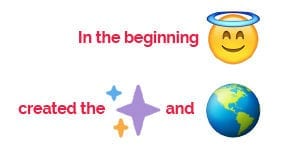 There is a trend today of making things easier, faster and less complicated: fast food you grab on the go, gourmet coffees that keep us running like machines, smart phones, which may eventually be smarter than us, and an obsession with text messaging in place of face-to-face communication. To add flair and personality to these texts, many have even fallen in love with emojis — those tiny little icons that quickly express emotion in a single image. Inventive minds are constantly focusing on making technology more helpful and intuitive. Now you can add to that list Internet emojis replacing God’s words.
There is a trend today of making things easier, faster and less complicated: fast food you grab on the go, gourmet coffees that keep us running like machines, smart phones, which may eventually be smarter than us, and an obsession with text messaging in place of face-to-face communication. To add flair and personality to these texts, many have even fallen in love with emojis — those tiny little icons that quickly express emotion in a single image. Inventive minds are constantly focusing on making technology more helpful and intuitive. Now you can add to that list Internet emojis replacing God’s words.
The word into smileys
In an attempt to make Scripture more fun, relatable and easier to read for young people, an anonymous author, identifying only as the cool-dude-with-sunglasses emoji.  He has come up with his own Bible version, Bible Emoji: Scripture 4 Millenials (misspelling intended by app creator).
He has come up with his own Bible version, Bible Emoji: Scripture 4 Millenials (misspelling intended by app creator).
What started as a Twitter feed where this self-described techie had been posting emojified Bible verses for almost a year, was made available last month as an App at the iTunes store for US $2.99. In this new form, God’s Word is translated into emojis that have no gender, no race and supposedly no agenda. The book of Genesis can be read like this:
Described as a “great and fun way to share the Gospel,” and touted as a 21st-century Christian Bible update, Bible Emoji interprets all 66 books of the King James Version with Unicode-approved emojis in different shapes and sizes, from angels to oceans and burning bushes to smiling yellow faces, twinkling stars and cartoon serpents, along with other forms of online slang.
Friendly or frightening
Critics are accusing this project of being part of “the satanic illuminati agenda and ushering in of the Antichrist,” and they believe no one should be translating the New and Old Testaments into emoji form and call it a fun experiment. Other commentators feel that this is a friendly tool Christians should embrace, as it makes Scripture more accessible and present in this world.
The anonymous author told The New York Times that he began posting the translations on his @BibleEmoji Twitter account after playing around with an online translator. The full version is more than 3,000 pages or “all 66 glorious books,” as the author said in the phone interview.
“I just started playing around with the translator, and I thought it might be kind of fun to use emojis, then I thought it would be fun to do the Bible and see how it would come out,” he said.
Sounds friendly enough, right? Well, not really. He started tweeting out the results beginning with the book of Genesis. He also started a website where users can generate emoji translations of their own. Surprisingly, he began getting good results from the tweets, which according to The New York Times report, “avoided the more violent and negative things in the Bible.”
Though the author included the book of Leviticus in the complete book, he omitted it in his tweets because according to him, it condemns homosexuality.
This was a red flag to some Christian readers, who began to dislike the tweets. Many commentators are criticizing it for mocking religion and using it in a cynical and desperate attempt to dilute Scripture and in the process corrupt young minds.
The author of this book has responded by saying that no part of the Bible has been rewritten, only condensed and emojified, like the word “and” becomes “&” and the word “earth” becomes a globe, yet the question remains: should any man tamper with God’s Word — a divine revelation of God to 44 chosen human writers?
The author of the Emoji Bible may believe he can play fast and loose with Scriptures. But to distort God’s Word is not just a bad idea; it is presumptuous and perhaps even ungodly in nature. The number one tool God has given us to direct us in our holy pursuit is his word. Deuteronomy 4:2 says, “You shall not add to the word which I command you, nor take anything from it.” The reason God is so adamant on this is because “All your words are true” (Psalms 119: 160). Proverbs 30:6 says it best: “Do not add to his words, or he will rebuke you and prove you a liar.”
From beginning to end
Just as Genesis began God’s love story to us, the book of Revelation completes the Bible, and it has the strongest warning, as it has to do with the end times and the coming of the Lord to restore righteousness on earth. “If anyone adds anything to what is written here, God will add to that person the plagues described in this book. And if anyone removes any of the words from this book of prophecy, God will remove that person’s share in the tree of life and in the holy city that are described in this book” (Revelation 22:18-19, NLT).
That’s a strong warning. Yet, the author of the Emoji Bible says he can help kids better understand the Bible by replacing some of God’s words with symbols. “What makes emojis so great and part of the symbolism I wanted with this project is that emojis are universal in the strictest sense,” he said in the New York Times interview. “Emojis have no gender, no race and no agenda.”
Some users already find these words unpalatable. The development of Emoji Bible warrants caution amongst Christians, who perhaps should devote time to understand its impacts and the notion of symbols substituting words as friend or foe.
Since Emoji Bible has the potential to impact kids, will Christians re-direct their kids to read the real Bible? “I read the Bible to my kids daily,” said Adriana Gonzalez, a stay-home mom of twin girls in West Palm Beach. “And not just because the stories are awesome; I read it because it is the Word of God.” She realizes that there will be a whole lot they won’t understand at first, but that’s what prayer is for—to seek the Lord’s Holy Spirit to reveal his direct message to us.
“For the word of God is alive and powerful. It is sharper than the sharpest two-edged sword, cutting between soul and spirit, between joint and marrow. It exposes our innermost thoughts and desires” (Hebrews 4:12).
Maritza Cosano is a freelance writer/editor, writing teacher and author of young adult books. She offers editorial and publishing services for writers and can be reached at [email protected].


Comments